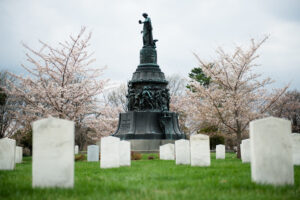
(Arlington National Cemetery photo by Rachel Larue)
by Shaun Kenney
Former Virginia Democratic U.S. Senator Jim Webb is begging federal officials to save the last remaining Confederate memorial at Arlington National Cemetery in a forceful op-ed to The Wall Street Journal. Webb writes:
[President William] McKinley understood the Civil War as one who had lived it, having served four years in the 23rd Ohio Infantry, enlisting as a private and discharged in 1865 as a brevet major. He knew the steps to take to bring the country fully together again. As an initial signal, he selected three Civil War veterans to command the Cuba campaign. Two, William Rufus Shafter, given overall command of the Cuban operation, and H.W. Lawton, who led the Second Infantry Division, the first soldiers to land in the war, had received the Medal of Honor fighting for the Union. The other, “Fighting Joe” Wheeler, the legendary Confederate cavalry general, led the cavalry units in Cuba, after being elected to Congress in 1880 from Alabama and working hard to bring national reconciliation.
Four days after the Spanish-American war ended, McKinley proclaimed in Atlanta: “In the spirit of fraternity we should share with you in the care of the graves of Confederate soldiers.” In that call for national unity the Confederate Memorial was born. It was designed by internationally respected sculptor Moses Jacob Ezekiel, a Confederate veteran and the first Jewish graduate of the Virginia Military Institute, who asked to be buried at the memorial in Arlington National Cemetery. On one face of the memorial is the finest explanation of wartime service perhaps ever written, by a Confederate veteran who later became a Christian minister: “Not for fame or reward, not for place or for rank; not lured by ambition or goaded by necessity; but in simple obedience to duty as they understood it; these men suffered all, sacrificed all, dared all, and died.”
Webb — an historian in his own right and the author of Born Fighting — explains briefly how the modern hagiography surrounding the Army of the Potomac fails to address the foundational interests of those who fought during the war:
The larger and ultimate question reaches further into America’s atrophied understanding of the Civil War itself. What was it that Union Army veteran McKinley understood about the Confederate soldiers who opposed his infantry units on the battlefield that eludes today’s monument smashers and ad hominem destroyers of historical reputations?
McKinley’s fellow soldiers understood that during the Civil War, four slave states remained in the Union—Maryland, Delaware, Missouri and Kentucky—and none of them were required to give up slavery during the entire war. And that in every major battle of the Civil War, slave owners in the Union Army fought against non-slave-owners in the Confederate Army. They understood that President Lincoln’s Emancipation Proclamation did not free the slaves in those states or in the areas of the South that had already been conquered. The proclamation freed only slaves in the areas taken after it was issued. And in the eyes of a Confederate soldier, if Lincoln had not freed slaves in the union, why should the soldier be vilified for supposedly fighting on behalf of slavery?”
As if to reinforce the point, Webb invokes the memory of none other than the great African-American historian, John Hope Franklin:
Many soldiers in the North, and many more in the South, would have understood what John Hope Franklin (1915-2009), America’s most esteemed black historian, pointed out: In 1860 only 5% of whites in the South owned slaves, and less than 25% of whites benefited economically from slavery. An estimated 258,000 Confederate soldiers died in the war, about a third of all those who fought for the South. Few owned slaves. So why did they fight?
The soldier who wrote the inscription on the Confederate Memorial knew. And so did President McKinley and most veterans who have fought in America’s wars.
Webb concludes with a powerful example of national reconciliation in Vietnam, where after a bitter two-decade civil war, the Vietnamese struggled with their own reconciliation. By way of example, Webb took a delegation to visit Arlington and showed them how Americans — after bitter conflict — effected their own reconciliation.
The Biden administration has ordered the removal of the Confederate memorial at Arlington by the end of 2023.
Shaun Kenney is the editor of The Republican Standard, former chairman of the Board of Supervisors for Fluvanna County, and a former executive director of the Republican Party of Virginia.
Republished with permission from The Republican Standard.

Leave a Reply
You must be logged in to post a comment.